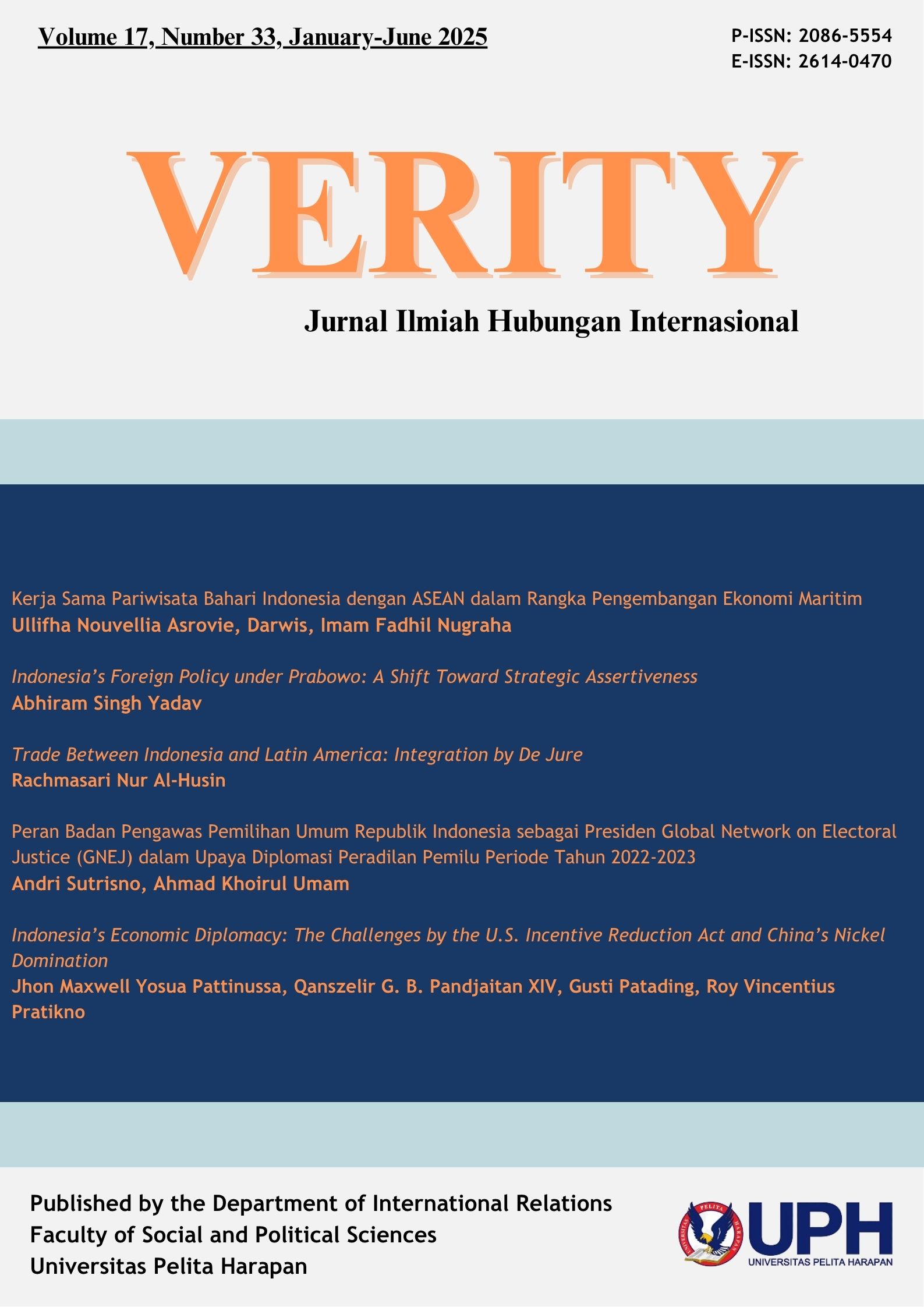Indonesia’s Economic Diplomacy: The Challenges by the U.S. Incentive Reduction Act and China’s Nickel Domination
DOI:
https://doi.org/10.19166/verity.v17i33.9666Schlagworte:
United States, Indonesia, Incentive Reduction Act, Nickel, Free Trade AgreementAbstract
Indonesia, as the world’s largest producer of nickel, faces significant challenges in leveraging its resources for economic development. These challenges are compounded by external pressures, including the U.S. Inflation Reduction Act (IRA), and internal issues related to China’s dominance in Indonesia’s nickel sector. Despite its vast nickel reserves, Indonesia is excluded from the green incentives provided under the IRA, which threatens to undermine its strategic position in the global nickel supply chain. The study seeks to understand the underlying factors driving this exclusion and the impacts of China’s dominance on Indonesia’s nickel industry. This research employs an explanatory qualitative approach, drawing from literature reviews and interviews with an industry expert. The methodology focuses on interpreting the interrelations between international trade policies, environmental sustainability, and Indonesia’s domestic challenges. The study identifies three key factors behind Indonesia’s exclusion from the IRA: the lack of a Free Trade Agreement (FTA) with the United States, environmental concerns over Indonesia’s mining practices, and the significant presence of Chinese companies in Indonesia’s nickel sector. China’s dominance has also led to environmental degradation, reduced domestic industrial competitiveness, and economic dependency. To address these challenges, the research proposes that Indonesia negotiate an FTA with the United States. Such an agreement would create a framework for accessing IRA incentives, strengthen Indonesia’s economic sovereignty, and mitigate China’s dominance. While the negotiation process will require strong political will and careful diplomacy, it presents a viable path for Indonesia to secure its economic and geopolitical interests.
Literaturhinweise
Baraputri, V. (2023). Nikel Indonesia: Limbah Tambang Mengancam Lingkungan di Sulawesi Tenggara - “Yang Kamu Rusak Adalah Masa depannya” - BBC news Indonesia. BBC News. https://www.bbc.com/indonesia/articles/c870n03351xo
CNN. (2022, November 1). Wajar Ramai Tka China di industri nikel, Wong investasi Dari Mereka. CNN Indonesia. https://www.cnnindonesia.com/ekonomi/20221101065101-92- 867816/wajar-ramai-tka-china-di-industri-nikel-wong-investasi-dari-mereka
Desk, N. (2023, August 19). Indonesia, EU trade barbs over biodiesel import duties. The Jakarta Post. https://www.thejakartapost.com/business/2023/08/19/indonesia-eu-trade- barbs-over-biodiesel-import-duties.html
DOE, U. (2022, August). The inflation reduction act drives significant ... - department of energy. https://www.energy.gov/sites/default/files/2022- 08/8.18%20InflationReductionAct_Factsheet_Final.pdf
House, W. (2023, September 21). Inflation reduction act guidebook. The White House. https://www.whitehouse.gov/cleanenergy/inflation-reduction-act-guidebook/
Karyza, D. (2023, February 10). Nickel still crucial for EV batteries: Industry players. The Jakarta Post. https://www.thejakartapost.com/paper/2023/02/10/nickel-still-crucial-for- ev-batteries-industry-players.html
Kumar, A., Mehta, N., Badlam, J., Silvis, J., & Cox, J. (2022, October 24). The inflation reduction act: Here’s what’s in it. McKinsey & Company. https://www.mckinsey.com/industries/public-sector/our-insights/the-inflation-reduction- act-heres-whats-in-it#
Laksono, F. A., Permanajati, I., & Mualim, R. (2020). Analisis kualitas air di Lahan Reklamasi pertambangan Nikel Desa Mohoni, Petasia Timur, Morowali Utara. Jurnal Sains Teknologi & Lingkungan, 6(1), 96–104. https://doi.org/10.29303/jstl.v6i1.142
Listiyadi, I. (2018). Developing strategy to improve market access: Indonesia-US FTA. Buletin Ilmiah Litbang Perdagangan, 1(1), 48–67. https://doi.org/10.30908/bilp.v1i1.293
Nga. (2023). Inflation reduction act: Infrastructure implementation resources. National Governors Association. https://www.nga.org/ira-resources/
Nugroho, A. S. (2022). Pembatasan sebagai solusi pelarangan ekspor bahan baku nikel: studi kasus ekspor bahan baku nikel indonesia. Jurnal Perspektif Bea Dan Cukai.
Nurbaiti, Boedoyo, S., & Yusgiantoro, P. (2022). Pengelolaan nikel indonesia terhadap pertahanan negara dan ketahanan energi. Universitas
Pertahanan Republik Indonesia.
Prasetiyo, P. (2017). Tidak Sederhana Mewujudkan Industri pengolahan nikel laterit Kadar Rendah di Indonesia Sehubungan Dengan Undang-Undang Minerba 2009. Jurnal Teknologi Mineral Dan Batubara, 12(3), 195–207. https://doi.org/10.30556/jtmb.vol12.no3.2016.139
Putri, A. S. (2020, June 22). Keadaan Flora Dan Fauna Indonesia halaman all. KOMPAS.com. https://www.kompas.com/skola/read/2020/06/22/140000569/keadaan-flora-dan-fauna- indonesia?page=all
Radhica, D., & Wibisana, R. (2023). Proteksionisme Nikel Indonesia dalam Perdagangan Dunia. Journal of Trade Development and Studies.
Ranggasari, R. (2023, July 14). US Geological Survey: Indonesia is world biggest nickel producer with 21mn mt reserves. Tempo. https://en.tempo.co/read/1748201/us- geological-survey-indonesia-is-world-biggest-nickel-producer-with-21mn-mt-reserves
Setiawan, K., & Setiawina, N. (2019). ANALISIS DAYA SAING SERTA FAKTOR- FAKTOR YANG MEMPENGARUHI EKSPOR BIJI NIKEL DI
INDONESIA. Unversitas Udayana.
Tim. (2023, July 6). Jadi Raja Nikel Dunia, Kapan Cadangan Ri bakal habis?. ekonomi. https://www.cnnindonesia.com/ekonomi/20230706145130-85-970248/jadi-raja-nikel- dunia-kapan-cadangan-ri-bakal-habis
Veröffentlicht
Ausgabe
Rubrik
Lizenz
Copyright (c) 2025 Jhon Pattinussa

Dieses Werk steht unter der Lizenz Creative Commons Namensnennung - Weitergabe unter gleichen Bedingungen 4.0 International.
Authors who publish with this journal agree to the following terms:
1) Authors retain copyright and grant the journal right of first publication with the work simultaneously licensed under a Creative Commons Attribution License (CC-BY-SA 4.0) that allows others to share the work with an acknowledgement of the work's authorship and initial publication in this journal.
2) Authors are able to enter into separate, additional contractual arrangements for the non-exclusive distribution of the journal's published version of the work (e.g., post it to an institutional repository or publish it in a book), with an acknowledgement of its initial publication in this journal.
3) Authors are permitted and encouraged to post their work online (e.g., in institutional repositories or on their website). The final published PDF should be used and bibliographic details that credit the publication in this journal should be included.


